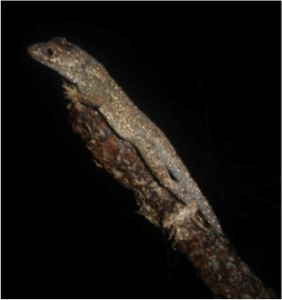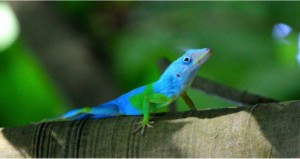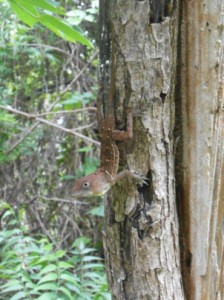Core alumna Martha Muñoz has recently been involved in some very interesting evolutionary research! Here the Core has laid out some of the information Martha provides on her own page:
I am studying how behavior can simultaneously impede and impel evolution in different traits in the lizard, Anolis cybotes, a species that ranges from sea level to nearly 3000 meters on the Caribbean island of Hispaniola.
…
I found that the behavioral change allowing lizards to maintain a constant body temperature is accomplished by altering the part of the environment they occupy.
…

A cold Anolis armouri covered in rain and roosting on a branch. Location: Loma de Toro, Sierra de Baoruco, Dominican Republic. Elevation = 2318 m.
In collaboration with Dr. Adam Algar at the University of Nottingham I am studying how physiological traits have evolved in the cybotoids, an environmentally-diverse clade of lizards from the Caribbean island of Hispaniola. We found that cold tolerance evolves considerably faster than heat tolerance in this group. Thermoregulatory behavior appears to exert a mediating force on rates of physiological evolution in this group.
…

Photo of Anolis marmoratus speciosus from the island of Grande Terre, Guadeloupe. Photo by TJ McGreevy.
In collaboration with Dr. Chris Schneider from Boston University I worked on a project examining adaptive divergence in colorful signals the Anolis marmoratus species complex from the Caribbean island of Guadeloupe. Male of this species display striking divergence in the colour and pattern over small geographic distances. We found that colour variation evolved without geographic isolation and in the face of gene flow, consistent with strong divergent selection and that both ecological and sexual selection are implicated.
…
The Core encourages CC105 and CC106 students involved in the study of evolution, and biodiversity, to look for opportunities that will let them take part in such fascinating research.

